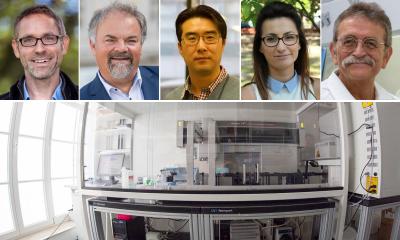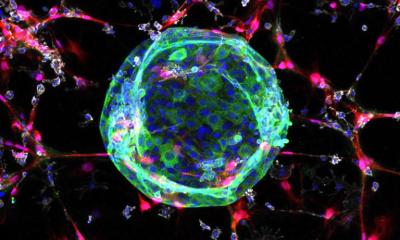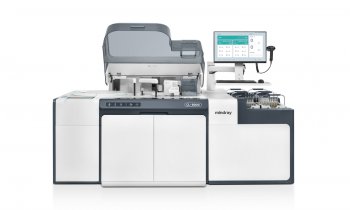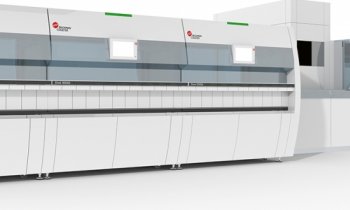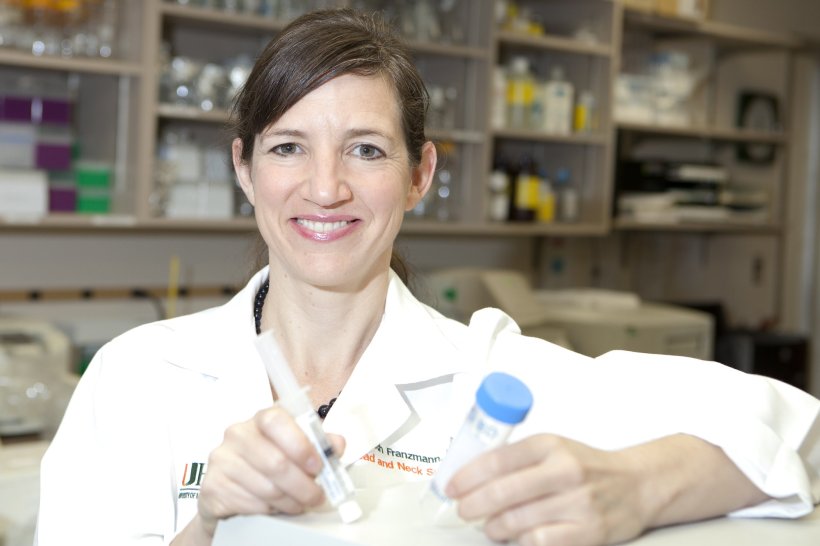
Image credit: Sylvester Cancer
News • Promising research on oral rinse-based test
Wash, rinse – detect head and neck cancer?
What if a mouthwash-based test to detect biomarkers can help physicians predict disease recurrence in head and neck cancer patients?
This scenario seems closer to reality after a new study by researchers at Sylvester Comprehensive Cancer Center at the University of Miami Miller School of Medicine, UC San Diego Health and collaborating cancer centers. Their findings, published in the peer-reviewed journal JAMA Otolaryngology – Head & Neck Surgery, could improve how physicians predict and detect recurrence with these cancers.
“Our study suggests biomarker detection in saliva collected from an oral rinse after initial treatment offers potential to readily assess recurrence risk,” said Elizabeth Franzmann, MD, a head and neck surgeon at Sylvester, and co-corresponding author of the study. “Elevated levels of either of two biomarkers were associated with disease return.”
Our laboratory assays showed an association between biomarker levels and later recurrence. Compared to patients with normal protein levels three months after treatment, patients with about twice as much total protein had an estimated 65% greater risk of recurrence
Elizabeth Franzmann
Head and neck cancers account for nearly 4% of all cancers in the U.S. and are more commonly diagnosed in people over age 50, according to the National Cancer Institute. Men are more than twice as likely to be diagnosed with the disease. Primary treatment options include surgery and radiation, which can affect speech, swallowing and appearance, severely affecting a patient’s quality of life. These effects can be even worse after recurrence. Moreover, recurrence is not always easy to catch. “It can be very difficult to determine if what you’re observing is just post-treatment changes or a cancer recurrence,” explained Joseph Califano III, MD, director of UC San Diego’s Hanna and Mark Gleiberman Head and Neck Cancer Center and the study’s co-corresponding author. “Good biomarkers could help remove some of the guesswork.”
Franzmann, whose research lab is focused on finding an inexpensive, noninvasive screening test for these cancers, emphasized the importance of early recurrence detection. “These patients suffer terribly,” she said. “The more we can minimize those effects by catching recurrence early, the better we can mitigate patient morbidity and mortality.”
Previously, Franzmann and her team had studied how biomarkers in oral rinses can assess a person’s risk for developing oral or oropharyngeal tumors, the most common types of head and neck cancers. They found a link with two key biomarkers – CD44, a tumor-initiating molecule, and total protein levels.
In this new study, the researchers studied whether those two biomarkers could predict recurrence in already-diagnosed patients. Their clinical trial evaluated the effects of CD44 and total protein levels in 160-plus patients across multiple cancer centers. Patients were provided oral-rinse samples for use up to 18 months after their initial treatment.
To measure biomarker presence, the researchers used laboratory tests and experimental lateral-flow tests, technology similar to stick-based pregnancy and Covid-19 tests. “Our laboratory assays showed an association between biomarker levels and later recurrence,” Franzmann said. “Compared to patients with normal protein levels three months after treatment, patients with about twice as much total protein had an estimated 65% greater risk of recurrence.” She added that patients with CD44 levels that were triple the normal level had an estimated 62% percent greater recurrence risk.
The study also generated early data on a rapid, point-of-care test to measure these biomarkers, with the findings expected to help hasten its development. “It would be really useful if we had a test that was inexpensive and could be performed and resulted while the patient was in the office,” said Franzmann. “That’s the area we are focusing on.”
She and collaborators noted that although additional research is needed, biomarkers show great promise for refining risk prediction in patients with head and neck cancers. Better risk prediction, in turn, has the potential to save lives by reducing the need for harsh, invasive treatments. Thanks is extended to Vigilant Biosciences for their contribution to this work.
Support for the study was provided by the U.S. Department of Health and Human Services (HHS), the National Institute of Health (NIH) and the National Cancer Institute (NCI).
Disclosures: Franzmann is an inventor of intellectual property used in the study. She and the University of Miami may receive royalties for future commercialization of the intellectual property. Additionally, the University of Miami and Franzmann hold equity in Vigilant Biosciences, licensee of the intellectual property. Franzmann is also the scientific founder, advisor and consultant for Vigilant Biosciences.
Source: University of Miami Miller School of Medicine
16.08.2024




